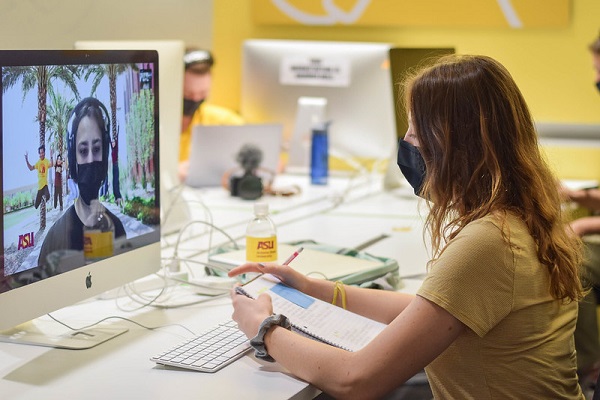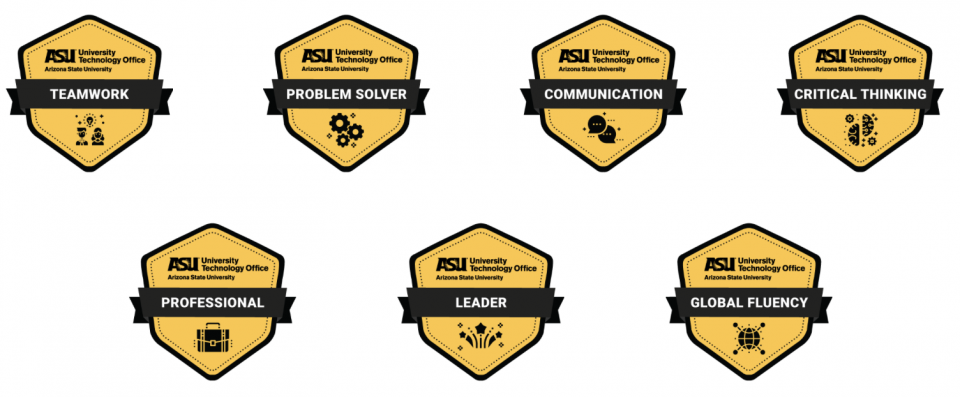Digital Credentials validate Sun Devils’ professional skills beyond the classroom
Arizona State University is looking at new ways to recognize skills and professional development that students are acquiring not just in class but from participating in extracurricular activities, from student jobs to leadership and service within student organizations and beyond.
Digital credentials are one way that students are being recognized for formal and informal education to provide validation of accomplishments and experience that can give students a competitive edge in future job searches. Embedded in each credential is meta-data that details information such as how the digital credential was earned and who issued it.

Photo by Venu Gopinath Nukavarapu
The Learning Futures Collaboratory and Learning Experience, part of the University Technology Office, has rolled out Digital Credentials at ASU to provide students a verified way to articulate academic and life skills to peers, educational providers and future employers. The initiative also assesses how the credentials line up with 21st century skills and competencies. A digital credential is also known as a digital badge.
“When applying for jobs and internships, students are having difficulty articulating exactly what those skills are. They might have done something in class but failed to recognize they did,” said Allison Hall, the director of learning experience transformation. She said part of the context of the initiative is that not every skill that students acquire or develop as part of their ASU experience is reflected on their transcripts.
A universitywide pilot program introducing the credentials was launched last fall, providing students access to badges from different programs, activities and organizations. Hall said the next step for the initiative will be to scale digital badges for every student in the university while protecting the value of the credential.
Hall said what is unique about the initiative is ASU’s focus on inclusion and innovation.
“We are in the place to do a generational leap of how these badges are being used. A lot of colleges that have tried this previously in a highly regulated manner, and there are only a handful of badges that existed as they wanted to protect their brand,” she said. “At ASU, with inclusion being such an important part of our charter, we want to leverage the badges to recognize new fields of study, new careers that are emerging and might not have an official degree path or certification in the field.”

Digital Credential badges
One of the biggest pilot programs that Hall is advancing is the working learners’ program, where Sun Devils will have the opportunity to earn certifications through half-credit micro-courses based on a variety of tasks they perform as ASU student workers, as members and leaders within ASU clubs and organizations and as community volunteers. Hall is excited that these certifications and half-credit courses will be available for all students and are free for student workers at ASU.
With the digital badges being an important aspect of recognizing different skills, students at ASU will be able to better acknowledge formal and informal education.
Hall said the opportunity to name and articulate the richness of their student experience will be invaluable for Sun Devils.
“We are working to make a comprehensive, lifelong learning record that students can own and recognize throughout their lives. If you go to other institutions and have other learning experiences that are not going to be acknowledged on their transcripts, badges are a way to empower students to own their story and be able to tell their learning and work story, all in one place,” Hall said
One other similar initiative at ASU is the Trusted Learners Network, which is a way for students to digitally track and transport digital credentials for learning across their college and career development.
Hall said that transcripts and resumes do not always reflect all the skills that students acquire in college, but these skills are crucial for recruiters to identify good potential candidates. She believes that badges can bring a change in how students can better represent their skillset and things that they have learned within the courses.
Learn more about the Digital Credentials program at ASU.